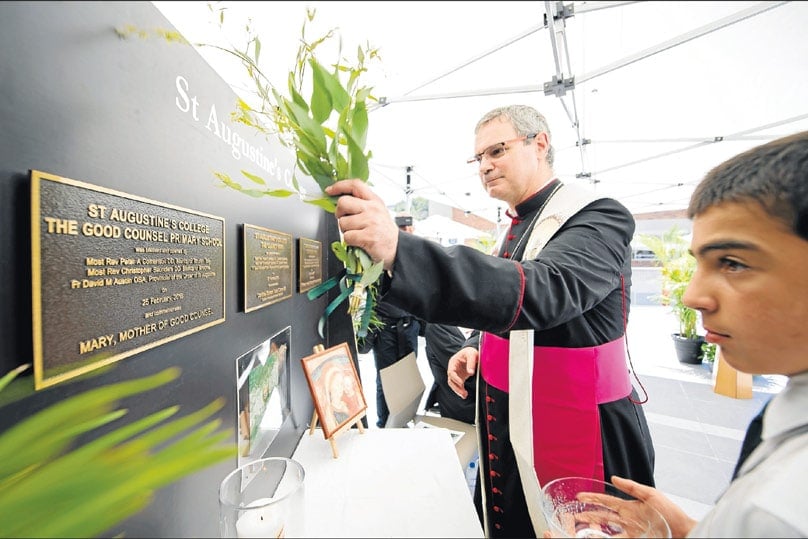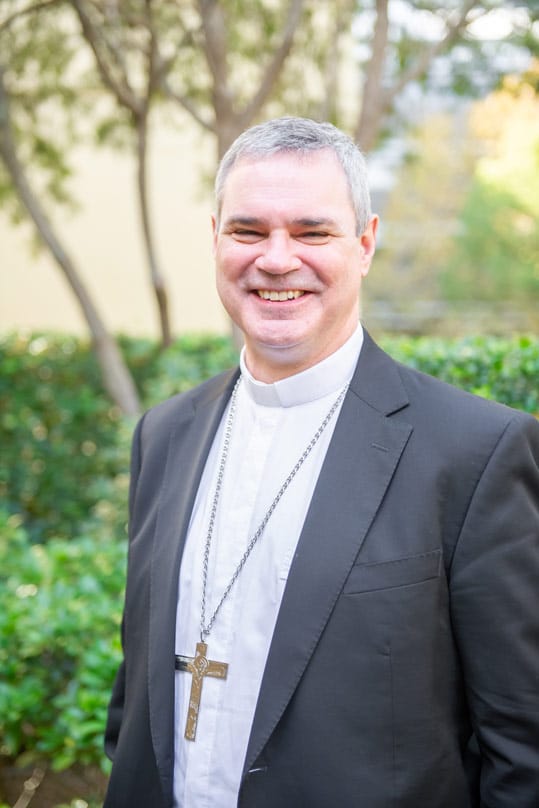
Melbourne’s new archbishop Peter Comensoli says he wasn’t completely surprised at being appointed an archbishop but it was “certainly unexpected”.
There were ‘inklings’ that his was one of the names floating around for a replacement for Archbishop Denis Hart, aged 77, who was due to retire.
“But I genuinely expected that a couple of others were far more likely possibilities,” he says.
The apostolic nuncio, Archbishop Adolfo Tito Yllana, called the outgoing Bishop of Broken Bay with Pope Francis’ request during rugby league’s second State of Origin game – the decider, which the NSW Blues won.
“It was annoying,” he laughs.
“I thought, ‘Who’s this ringing during the footy?’ and I look and the Nuncio’s number’s come up on the phone and I thought ‘Oooh, I’d better take this one’.”

Within a week, the announcement was made and the Wollongong and Sydney native had broadcast his first video message to the Church in Melbourne – including his promise to learn the “mysterious code of football called AFL”.
“I do not know Melbourne at all, I do not know Victoria, I’m walking into a sense of a strange land which I don’t know physically, culturally, socially,” he says.
“I just know that it’s different and there’s an awful lot of learning that will have to happen first and for me it’s learning in friendship.
“Otherwise it’s unconnected to the life of faith.”
Archbishop-elect Comensoli will now tend the 1.1 million Catholics who make up the archdiocese of Melbourne.
In sheer numbers, it’s the largest Catholic flock in the country. “I will love our people in Melbourne. I may not do it effectively at times, we all fail in our loving but I love them. I haven’t met them yet, but I love them,” he says.
“It might sound trite but it is genuine.”
He said he’s preparing to bring the Gospel to them, but doesn’t know exactly what forms that will take, as the Gospel is grounded in the circumstances of people’s lives and of the archdiocese, which he is yet to discover fully.
But he is ready to weigh in against the country’s only assisted dying law, which will come into effect throughout Victoria next year.
A moral theologian and bioethicist, Archbishop-elect Comensoli is an experienced defender of the Church’s position on euthanasia and assisted dying as the bishops’ delegate for family, youth, and life with a particular responsibility for euthanasia, life matters and media.
“There is a lot of work that needs to be done. It’s not just a matter of saying, the legislation has gone through and that’s it, we have to get used to a new thing,” he says.
“I don’t know all the details at the moment but the elements of the legislation are now currently being worked out.
“I hope the state parliament would be willing to hear my voice, which is not only my voice but the voice of our faith I that profess.
“I see myself as someone who will be wanting to protect our hospitals and aged care facilities and so on from having to cooperate in assisted dying in any way or form.
“I would hope that I will be able to come in and have something to speak into the ongoing workings out of all of this.”
He also hopes to start looking for a new home in Melbourne before his 1 August installation Mass at St Patrick’s Cathedral.
“I’ve always preferred to live in a house with other clergy and kind of form a community of some sort, so that’s what I hope to be able to do,” he says.
“I don’t know if I’m going to be able to do that, so we’ll see.”
In his statement that came with the announcement from Rome, the Archbishop-elect devoted a good portion to address the pain of the many people affected by historical child sexual abuse in the Church.
“I share the bewilderment and anger you feel at the failure of Church leaders to believe victims and to respond to them with justice and compassion. This is not the way of Jesus Christ,” he said.
“It is our solemn shared duty to right the grievous wrongs of the past and ensure that the future is very different.” He believes this attitude should be front of mind of any leader of the Church in Australia at this time.
“Whether it’s a bishop or any leader, righting the wrongs is absolutely essential, and also accompanying those who have been so terribly harmed as the result of abuse or subsequent inaction; the victims and survivors, their families, communities who have been impacted and so on.
“Rebuilding once again a culture of trust, safety and care within our community is absolutely essential.
“What has happened, both in terms of the abuse itself and the ineffectual or deeply problematic response to that, all of that is contrary to the Gospel.
“Now in staying that, I’m like everybody else a sinner, and many of my actions both in the past and into the future will be contrary to the Gospel in different ways – I’m not talking about sexual abuse here at the moment.
“But I’ll be having responsibility for this very serious issue within the life of the Church in Melbourne now, which is something of an epicentre of the country in this regard, and please God I make wise and prudent and Gospel decisions around that.”
The popular leader has some advice for the people of Broken Bay, whom he has served for the past three and a half years, as they await an announcement about his eventual replacement.
“Love whoever it’s going to be. Start the loving now. Prepare your heart to receive the one that the Lord might have for you.
“As a bishop, this is not my diocese in a sense, I’m a steward, and my stewardship here is complete now under the decision of Pope Francis.
“And like a good steward I may have to give an account of my stewardship but I also hand it over now to someone else for their care.”
